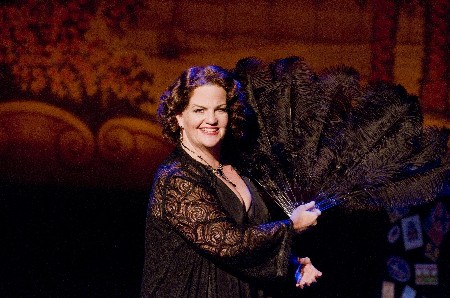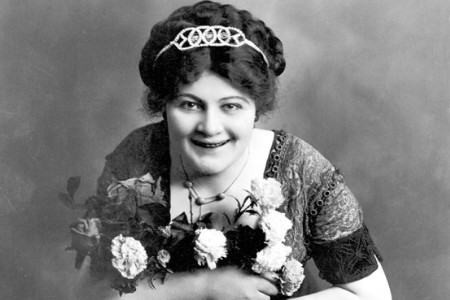Theater Review: Sophie Tucker, Lukewarm Mama

Mary Callanan is a red hot talent, but her Sophie Tucker doesn't sizzle. Photo by Andrew Brilliant/ Brilliant Pictures.
Sophie Tucker: The Last of the Red Hot Mamas, By Richard Hopkins, Jack Fournier, and Kathy Halenda. Directed by Kate Warner. Musical Direction by Todd C. Gordon. Staged by New Repertory Theatre at the Arsenal Center for the Arts in the Charles Mosesian Theater, Watertown, MA, through July 11.
Reviewed by Alyssa Machado
Vaudeville star Sophie Tucker (1884–1966) earned the nickname “The Last of the Red Hot Mamas” by boldly titillating audiences with progressive songs and jokes celebrating female sexuality. One of her most popular songs, “Yiddishe Momme,” sung partially in Yiddish, caused an uproar between anti-Semites and other audience members during a performance in France in 1932 and was later banned by Hitler. Even her comic tunes like “Living Alone and I Like it” and “I Don’t Want to Get Thin” challenged social norms in a playful and frank manner.
Nothing about Tucker was bland or old-fashioned, which makes the dull and dated revue presented by the New Repertory Theatre particularly disappointing. Despite a valiant effort from Mary Callanan, who plays Tucker with an appropriately commanding presence, voice, and attitude, the show never manages to make the legendary entertainer appealing or relevant to a modern audience.
Perhaps Tucker can’t be transplanted successfully out of her historical context. After all, the risque lyrics about female sexual liberation that entranced people in the star’s own time are staid today. The jokes remain suggestive, but they hardly shock in a time when Lady Gaga rules, and explicit lyrics and overtly sexy costumes are the norm. Even in the more demure musical theater genre partially nude actors fake sex on stage (Spring Awakening) and sing brassy numbers about accepting women of any weight (Hairspray). Tucker’s routines no longer provide any illicit thrills.
More likely, however, the flaws reside in the show itself. The book, written by Richard Hopkins, Jack Fournier, and Kathy Halenda, is barely a book at all. Scattered haphazardly between and within songs, the script consists of a mix of anecdotes disparaging men, a peppering of famous Tucker quotes, and a few brief facts about her career and personal life. The latter are too meager to convey a solid chronological sense of Tucker’s life, let alone paint a cohesive and revealing portrait.

Sophie Tucker: The show doesn't give us a vivid enough sense of her life.
As for the jokes, when they aren’t suggestive, they are painfully corny and dated (“Why are Jewish marriages so expensive? Because they’re worth it.”). In fact, the playwrights were not responsible for the few truly smile-worthy moments: they sprang from improvisation between Callanan and some good-humored audience members.
Most of the 22 songs sport simple and repetitive lyrics on the same subjects: celebrating female sexual escapades and affairs, mocking men as unreliable, impotent, or cheaters (or all of the above), or recovering from a failed romance. Most of them require a confident, flirtatious, and bold delivery. Even though Callanan supplies the needed moxie with power and panache, the similarity of the numbers becomes repetitious, especially in the first act. The few songs that encourage Callanan to explore the softer and more vulnerable side of Tucker offer a compelling glimpse of the contemporary singer’s dramatic abilities. For example, the a capella beginning to “After You’ve Gone,” is sung softly, suggesting a quiet, internalized passion that hushed the somewhat chatty audience.
The scenic design by Joseph O’Dea and staging by director Kate Warner adds little sizzle to the proceedings. With only three small set pieces (a painted backdrop, apartment furniture on stage left, and the piano on stage right), much of the center and upstage space went unused. While historically appropriate, the pastel-colored, park scene backdrop didn’t coordinate with Callanan’s costumes (red and black evening gowns) or enhance the sensual and bold tone of the songs. Tucker’s apartment set, used for her softer and sentimental songs, lost its intended intimate feel because it is located too far upstage and stage left. Add some sparse blocking, which has Callanan standing or sitting still to sing far too often, and you have a production that feels static, ironically restrained given the size of Tucker’s personality.
Many older theater patrons at the production, perhaps more familiar with the vaudevillian tradition of Tucker’s classics, seemed to find the revue entertaining. For me, however, Sophie Tucker felt dull and behind the times, a wan wallow in nostalgia that does a disservice to a woman as daring, progressive, and funny as Sophie Tucker and a talent as red hot as Mary Callanan.
Tagged: Alyssa Machado, Kate Warner, Mary Callahan, New Repertory Theatre
